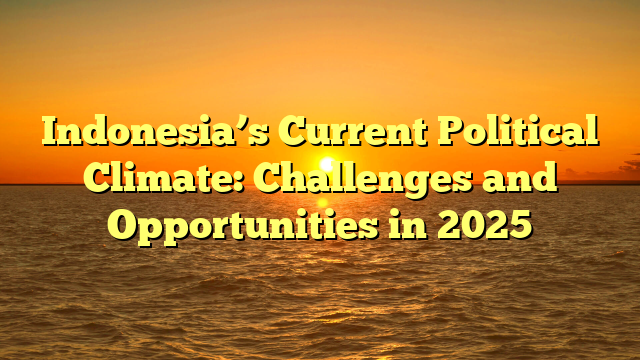Indonesia enters 2025 with a renewed sense of political momentum following the 2024 general elections, which marked a significant turning point in the nation’s democratic journey. As the largest democracy in Southeast Asia, the country continues to grapple with the challenges maritim4d of governance, democratic resilience, and economic transformation, while also navigating its place in an increasingly complex global environment.
The transition of leadership after President Joko Widodo’s decade-long tenure has been one of the most notable developments in Indonesia’s political landscape. Jokowi, widely recognized for his ambitious infrastructure programs and pragmatic leadership, left behind both achievements and unfinished challenges. His successor now faces the task of maintaining economic stability while addressing pressing social issues such as inequality, corruption, and the need for better governance across all levels of society.
Coalition politics remains at the heart of Indonesia’s system. With no single party able to secure an outright majority, coalition-building has once again become essential to forming a stable government. While this arrangement reflects the country’s diverse political spectrum, it also creates an environment of compromise. On one hand, coalition politics can encourage inclusivity; on the other, it can dilute reform efforts when political leaders prioritize short-term bargaining over long-term national interests. This tension continues to shape Indonesia’s policymaking process.
The state of democracy in Indonesia remains a subject of both optimism and concern. Free and fair elections reaffirm the strength of democratic institutions, yet critics point to troubling signs of democratic erosion. Issues such as the spread of disinformation, polarization along religious and ethnic lines, and the weakening of oversight institutions—particularly the Corruption Eradication Commission (KPK)—have raised alarms among civil society groups. Restoring public trust requires stronger transparency, accountability, and a renewed commitment to protecting civil liberties.
Corruption is perhaps one of the deepest-rooted challenges in Indonesian politics. Despite repeated campaigns against it, graft continues to undermine governance and public confidence. The reduced authority of the KPK in recent years has made anti-corruption efforts less effective, fueling public skepticism. Many Indonesians believe that tackling corruption must once again become a top priority for the government if democracy is to flourish in a meaningful way.
At the same time, Indonesia’s foreign policy has gained renewed attention. As a member of the G20 and the chair of ASEAN in recent years, Indonesia positions itself as a key regional actor and an advocate for peace and stability. Its balancing act between major powers such as the United States and China underscores the country’s pragmatic approach to diplomacy. Moreover, Indonesia’s efforts to promote economic partnerships and attract foreign investment highlight its desire to sustain growth while strengthening its role on the world stage.
Looking forward, the central challenge for Indonesia is how to balance continuity with reform. The government must deliver tangible results in improving welfare, safeguarding democracy, and fostering unity across its archipelago of more than 17,000 islands. Citizens are hopeful that the new administration will not only preserve the gains of past leadership but also implement bold measures to ensure a more inclusive and transparent political system.
Indonesia’s political journey in 2025 is far from easy, yet it carries great promise. If the nation succeeds in consolidating democracy while pursuing sustainable development, it can serve as a model for other emerging democracies around the world. The stakes are high, and the choices made today will shape the country’s political and social fabric for decades to come.
